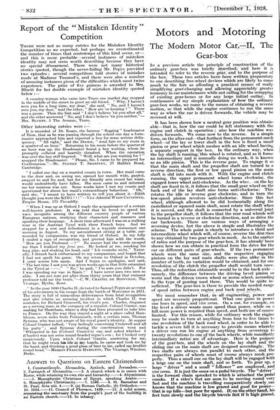Report of the "Mistaken" Identity Competition
THERE were not as many entries for the Mistaken Identity Competition as we expected, but perhaps we overestimated the number of times that contretemps of this kind occur, or— and thii is more probable—several instances of mistaken identity may not seem worth describing because they have no special denouement. There were not many historical stories quoted, though the never-failing Mr. Pepys provided two episodes • several competitors told stories of mistakes made at Madame Tussaud's, and there were also a number of amusing instances given of the difficulties which most twins experience. The prize of five guineas is awarded to Mrs. Bluett for her double example of mistaken identity quoted below :— A country-woman who came into Truro one market day stopped in the middle of the street to greet an old friend. " Why, I haven't seenyou for a long time, my dear," she said, " no, and I haven't seen you, my dear," said the other, " How are 'ee keeping " There was a pause. Then the first said " I don't believe 'tis you after all," and the other answered " No, and I don't believe 'tis you neither."— Mrs. BruEvr, 5 The Avenue, Truro.
"Other interesting entries were :- It is recorded of Dr. Keate, the famous " flogging " headmaster of Eton, that as he was passing through the school one day a form- master approached him and reported a boy for some serious delin- quency. " All right," said the Doctor, " send him to my room in a quarter of an hour." Returning to his room before the quarter of an hour was up, the Headmaster found a boy waiting, whom he promptly collared and heartily--thrashed. When the operation was over the boy still lingered. Well, what are you waiting for ? " snapped the Headmaster. " Please, Sir, I came-to be prepared for Confirmation."—Mr. SYDNEY T. SHARPLEY, 27 Halifax Road, Cambridge.
" I called one day on a married cousin in town. Her maid came to the door and, on seeing me, opened her mouth wide, gaspad, swayed to and fro and, but for my friendly arm round her waist, would undoubtedly have fallen. She soon came to and infermed me her mistress was out. Some weeks later I met my cousin and questioned her about her maid's extraordinary behaviour. " Oh," said she, " I meant to have written to tell you about it—Edith thought you were the KING ! ! 1"—Vice-Admiral WADE CatuthELD, Empire House, 175 Piccadilly.
" When I was up at Qxford,I made the riscquaintance of a certain well-known professor. It was told that he loved to spend his vacs. incognito among the different country people of various European nations, studying their characters and manners and speaking their language. A short time afterward I was on a walking tour in the Austrian Tyrol with three French boys. And we stopped for a rest and refreshment in a wayside restaurant one ' morning in August. To my astonishment sitting at a- table, sur- rounded by companions, was my friend of Oxford. In my folly I smiled a sign of recognition, and greeted him with the words, " How are you Professor —? " No sooner had the words escaped me than I realized my faux pas. He looked at me, smoking his long pipe, and shaking his head, said " Ich verstehe nicht." Natur- - ally, I shrank back embarrassed to my companions, and hoped that I had not spoilt his game. On my return to Oxford in October, I came across him again. And I began to apologize, and said, • " The last time I saw you was seven weeks ago in that little estaminet in the Tyrol at —. ' " No," he said, " I'm sure you didn't. For • I was spending my vac. in Spain ! ' I have never seen two men so alike. I am not sure yet after these thirty years that that eminent professor told me the- truth."—C. W. CHASTE'. DE Bonfvrraz, -The Vicarage, Hythe, Kent.
" In the year 1680 Charles II. dictated to Samuel Pepys an account of his adventures in his escape frena the battle of Worcester in 1651.
• The story is full of miraculous deliverances from fatal recognition and -alio -relates 'an amusing incident in which Charles II. was mistaken for Richard Cromwell, his rival's son. Charles, disguised as a serving man, in the company of a royalist, Colonel Gunter, was makipg for Shorehan where a skip had been procured to take him to France. On the way they stayed a night at a place called Ham- bleton, seven miles from Portsmouth, with a certain man, Thomas Symons, who was not aware of his royal guest's identity. At supper Colonel Gunter talked, Very feelingly concerning Cromwell and all his party ' ; and Symons during the conversation went and Whispered in his (Colonel Gunter's) ear, and asked whether I (Charles) was not some round-headed rogue's son ; for I looked very suspiciously. Upon which Colonel -Gunter, answering for me, that he might trust his life in nay hands, he came-and took me by the hand, and drinking a good glaiis of beer tolpe, railed n;c, 3hrother round-head."—MeruoN Faiaicis HAMILTON, The Vicarage, Windsor, Berks.








































 Previous page
Previous page